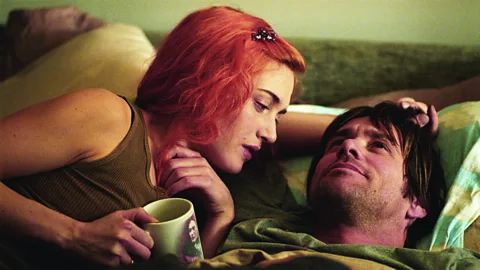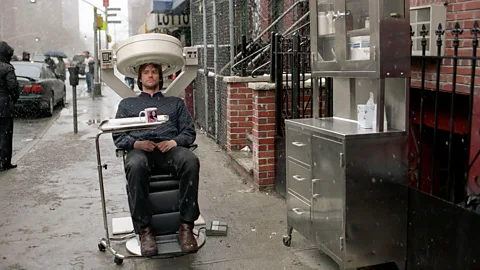How Eternal Sunshine of the Spotless Mind offered a warning about modern love and relationships
 Focus Features
Focus FeaturesBack in March 2004, one of the year's most talked-about films asked the audience a much-debated question: if you could erase the memories of a lover after a painful break-up, would you do it? And if you could, should you do it?
That film was Eternal Sunshine of The Spotless Mind, written by Charlie Kaufman and directed by Michel Gondry, which tackled the universal malaise of heartbreak through a surrealist and technological lens. Told in a non-linear narrative, it featured Jim Carrey and Kate Winslet in the lead roles of Joel and Clementine, who after a tumultuous relationship, both decide to use a service called Lacuna Inc, which wipes all recollections of a person from their memories. However, as the process begins, Joel begins to regret going through with it.
A hit with both critics and the public alike, it grossed $74m at the box office, earned Kaufman, Gondry and their collaborator Pierre Bismuth an Oscar for best original screenplay, and in 2017 was named one of The New York Times's best films of the 21st Century. Two decades on from Eternal Sunshine's release, it's a mark of the film's emotional and intellectual brilliance that it's still in the public consciousness. Indeed, Ariana Grande's new album, released a couple of weeks ago, is called Eternal Sunshine in tribute to the film, with her video for new single We Can't Be Friends recreating scenes from it – something which may encourage a whole new Gen Z reappraisal.
 Focus Features
Focus FeaturesThe sentiment underscoring the film's high-concept – and which gave it its title – comes from the 1717 Alexander Pope poem Eloisa to Abelard, which is quoted by the Lacuna Inc worker, Mary (Kirsten Dunst) in the film. "How happy is the blameless vestal's lot! The world forgetting, by the world forgot. Eternal sunshine of the spotless mind!" the verse runs – which, boiled down, translates as "ignorance is bliss". However, the movie, through its compelling representation of the workings of the mind and the complex science of memory and dreams, depicted using Gondry's signature lo-fi creative aesthetic, proves that this idea is a fallacy.
While the story's roots might lie in an 18th-Century epistle, Kaufman and Gondry drew from the sci-fi genre to create a parallel present-day world, in which everything appeared much the same – except for the fact of this technology, seemingly normalised within society, created to wipe brains of their memories.
When Joel takes a pill to kick the process off, Clementine having already done so, feckless Lacuna employees Stan (Mark Ruffalo) and Patrick (Elijah Wood) turn up with their machinery – and beers and marijuana – to begin the procedure of targeting and then zapping away his memories. Their boss, Dr Howard Mierzwiak (Tom Wilkinson), assures Joel: "When you eradicate that core it starts its degradation process. By the time you wake up in the morning, all the memories we've targeted will have withered and disappeared, as in a dream upon waking."
A very humanist sci-fi
How far out and fantastical was the concept at the time of the film's release? Lecturer Nicky Danino, head of computer science at Leeds Trinity University, says its conceit placed it in a sci-fi lineage. "There were a lot of sci-fi subcultures that had been happening for a long time that the mainstream didn't perhaps know about at that time – especially with writers like Philip K Dick – but when Eternal Sunshine came out, it took those ideas and concepts from the 60s and 70s and put them into the mainstream. It really exposed that concept of what technology can do to people."
However, part of the film's strength lies in how deftly it humanises its high-tech premise, exploring how we would interact with such futuristic wizardry in a very understated, everyday way. In a 2004 interview with Dazed Magazine, Gondry reiterated that he and Kaufman "definitely didn't want to make a science fiction movie. The procedure that the memory company Lacuna Inc uses is a device to explore someone's feelings of nostalgia, which is uncontrollable. I was reading in a book about the brain that we have the feeling of nostalgia when we think of a memory because the mind knows it is a moment of time that will never appear again."
 Warner Bros
Warner BrosProfessor Bruce Isaacs, chair of film studies at the University of Sydney, says that its hybrid of genres was part of its unique appeal on its release. "It was hard to say whether we were talking about science fiction or whether we were talking about realism and drama; it was [also] an arthouse romcom. It's not like it fetishes the tech, it's not a movie about that at all. The thing you go away with from Eternal Sunshine is that you really believe in this incredibly painful love story."
"That idea of wanting to escape the harshness of life, of wanting to find some peace or even to find a utopian world is such a big part of sci-fi," he continues, "and what I love about the film, it was done on such a personal level. [The focus was not on] a global or technological change – it was just a bunch of people living their lives, trying to navigate their way through romantic connections."
More like this:
– Is the mediocre romcom making a grand return?
But it also undoubtedly played into fears of how our increasing deference to technology might be abused, and manipulated by humans for their own nefarious gains. In one blatant conflict of interest, we learn that Patrick uses the knowledge he gleans from accessing Joel's memories with Clem to seduce her, stealing Joel's loving words and re-gifting his gifts to her, in a kind of romantic identity theft similar to catfishing – a term which didn't come into common usage online until 2010. We also learn that Mary has had the procedure following an affair with Dr Howard – and a subsequent abortion – that she obviously has no recollection of.
"That [sub-plot] was one of the things that really struck me when I [first] saw the film," says Isaacs, who explains that "Mary discovering 'I have been a subject of this and I didn't even know because I have no memory of it'" immediately made him think of Blade Runner, where Rachael first finds out she's a replicant, and Deckard says to her CEO boss Tyrell: "but how can it not know what it is">window._taboola = window._taboola || []; _taboola.push({ mode: 'alternating-thumbnails-a', container: 'taboola-below-article', placement: 'Below Article', target_type: 'mix' });
